Episode two of Moon Knight, “Summon the Suit,” is just about as fast-paced as the first! This one was directed by Justin Benson & Aaron Moorhead and written by Michael Kastelein, and they deliver exposition as elegantly as possible in among some excellent character moments, the introduction of a new person for Steven to sputter at endearingly, and MOAR JACKALS.
Spoilers ahead!
Recap
While I expected episode two to continue the pilot’s momentum by following Marc-as-Moon-Knight out onto the roofs of London, instead we wake up back with Steven, who jolts out of a “nightmare” and promptly crashes to the floor at the end of his leg restraint.
(I’m not sure how Oscar Isaac is mining even more comedy notes from “I’ve woken up with my face all smushed” but he’s doing it.)
When he gets to work, he sees that areas are being cordoned off, and is at first terrified/relieved that his “nightmare” actually happened, then even more terrified/relieved at the idea that he might be able to see everything on security footage, thus proving to other people that it actually happened. But of course all the footage shows is Steven, huddling away from an invisible jackal, and then Marc, glaring into a security camera after he’s dispensed with said jackal.
But of course Marc and Steven look exactly alike, so Steven is sacked. The HR rep is somewhat sympathetic, and even suggests a hospital that might be able to help him, but I’m still not sure how much he’s told people about his specific issues.
He goes to see his friend The Living Statue, talks through the idea of tracking down the security locker whose key he found in the pilot, and finally hugs the Statue as though the other man suggested it. Where last episode he never acknowledged Steven, this time he shifts his eye to look at Steven, and he doesn’t seem annoyed by the hug.
Steven finds the storage facility, and the attendant knows him and takes him to Unit 43. Once inside, Steven discovers that the space is set up kind of like a military encampment. There’s a cot in one corner, and a duffel bag full of currency, a gun, and Marc’s passport. Once again the show uses natural mirrors brilliantly—the walls of the facility itself are somewhat reflective, so Steven and Marc can talk through them. Marc finally tells Steven who he is—or at least that he’s an avatar of Khonshu—and tries to get him to relinquish control.
Steven, being Steven, grabs the bag and marches straight out the door to take the stuff to the nearest police station. Except Khonshu is not going to allow that, chases him through the flickering hallways and into the street, where he’s almost hit by a motorcycle. And the woman on the motorcycle just happens to be Layla, the woman who left about 800 messages on Marc’s phone.
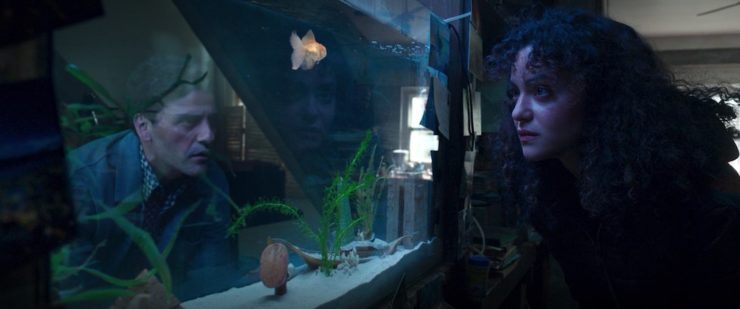
Layla takes him home, and we quickly learn that a) she’s his wife, er, Marc’s wife, b) Marc wants a divorce, she’s signed the papers, and she has them with her c) she does NOT buy all this “Steven” crap, and d) they were supposed to find that golden scarab together, is this why Marc disappeared, so he could find it for himself???
All this exposition hurtles poor Steven into what I can only describe as a Hugh Grant Event Horizon, and there is an orgy of stammering, attempted explanations, hair-fluffing, and head-ducking. At one point I’m pretty sure he insists he’d never divorce someone like her.
(Goddammit Oscar Isaac.)
Their adorable exposition is interrupted by people knocking on the door, and sweet naive baby Steven assumes they’re the police, come to arrest him about messing up a museum toilet. Luckily Layla swipes the scarab and climbs out the window before they get in. The show uses this moment for another better-than-it-could-have-been exposition volley, as Steven is handcuffed in the backseat of a car while the “officers” look up Marc Spector and narrate a few of his crimes. Steven keeps whimpering that he didn’t do any of that, occasionally catching his reflection in the rearview mirror or the car’s window.
Now obviously these people are not the police, or Scotland Yard, or MI-6. They’re followers of Arthur Harrow, delivering Steven into one of my favorite setpieces in this episode. The two leave Steven alone in the car, Steven and Marc argue, Marc wants to take over, Steven keeps saying no, and suddenly Arthur speaks over a walkie-talkie.
Arthur is the first person who has genuinely listened to Steven. He believes him about Marc, and he knows Khonshu is watching them, even anticipates a few of the god’s lines. He leads Steven into the community he runs—a series of apartment builds and a community center where people grow their own vegetables, keep goats, and are learning three languages each. That’s all before they get to the soup kitchen and Arthur announces he’s also vegan.
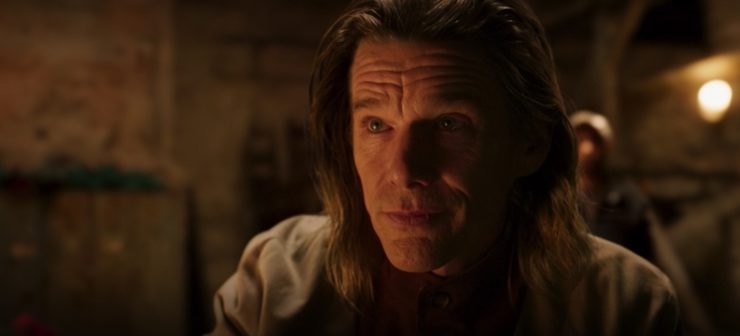
I hate to say it, but I’m leaning Ammitward, here.
Oh but WAIT, here comes the inevitable conversation about free will to spoil everything.
(Goddammit free will.)
Arthur explains that he understands Khonshu because he was Khonshu’s former avatar. Where Khonshu deals harsh judgement to evildoers, Ammit plans to get rid of the evildoers before the evildoing actually happens, which will be better for everyone in the long run. Arthur talks about this in an utterly calm, reasonable way. Loving, really. He wants everyone to be good. But he also longs for the day of Ammit’s judgement, when only the good are left standing. And when Steven points out that this plan means murdering children, Arthur sighs the long-suffering sigh of the True Believer, and begins to demand the scarab.
The scarab, it turns out, is the compass that will lead the followers of Ammit to her tomb. They need it so they can free her.
Marc, in the reflection of a soup bowl, yells at Steven not to give Layla up to Arthur—as though Steven would ever do such a thing—and Steven just keeps insisting he doesn’t have it, and Arthur starts talking about his cane and how it contains a fraction of Ammit’s power, and then Layla’s there, somehow, and now Arthur’s gone and summoned another jackal.
And here’s where things get even cooler! The jackal chases them through the compound, they barricade themselves in a room (…it seems to be full of mummies?), Layla yells at Steven to “summon the suit,” Marc yells at Steven to give up his body, and Steven mostly freaks out and keeps saying he can’t. Because, of course he can’t. He’s a terrified former gift shop worker. And in the midst of the chaos and the noise, Layla stops, crouches in front of him, and tells him it’s okay that he can’t.
Arthur is the first person we’ve seen listen to Steven, but Layla is the first one who’s heard him.
Which is nice and all but it doesn’t make the jackal go away. And here’s where shit gets even cooler: The (very real) jackal breaks the door down, but Layla can’t see him. She just sees Steven running away from… nothing. Somewhere in the midst of crashing through a window and falling to the street below, Steven summons the suit!
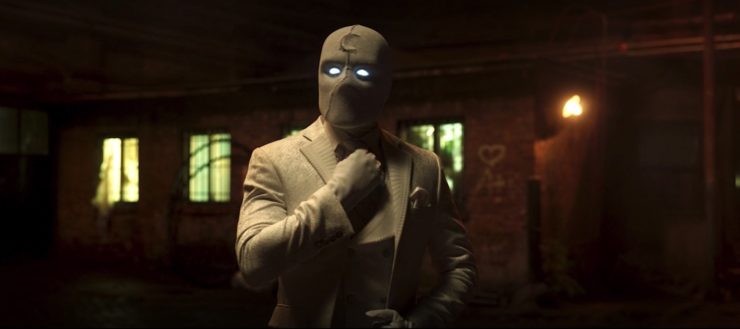
But it’s not the typical Moon Knight superhero costume we’ve seen, it’s a dapper, multi-layered glowing white suit suit.
Steven catches Marc in another window, and Marc mocks the suit a bit, but it seems to imbue Steven with strength, so they go with it. Steven fights the jackal and does a pretty good job, Layla helps by glassing the jackal in the face, but it’s clear that there are going to be civilian casualties if Marc doesn’t take over. Steven lets him in, Marc leads the jackal across the roofs and kills it.
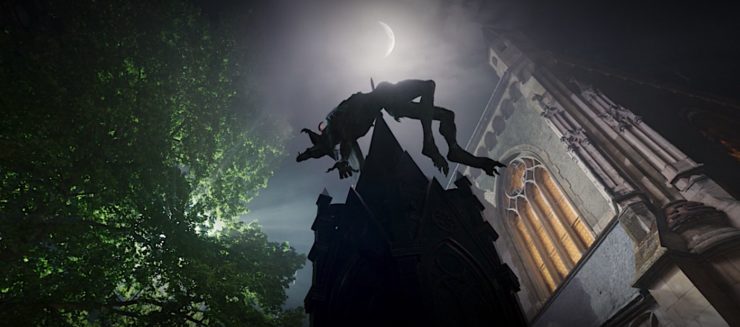
Meanwhile, Layla watches a homeless man find the scarab that was dropped in the fight. She sees Arthur approach the man, promise him food in exchange for the scarab, and then kill him once it’s handed over. And, unfortunately, Arthur sees her watching him.
I’m sure that won’t turn out to be a problem in a future episode.
Which is when we get the other great scene, where Marc and Steven argue, this time with Steven trapped inside and learning how terrible it feels to be conscious in a corner of Marc’s mind while Marc pilots their body. Marc claims that Khonshu wants Layla for his next avatar, and that that’s why he’s trying to shut her out. The scene plays out as an intense, externalized inner monologue, with Khonshu himself turning up as soon as Marc has attacked the mirror Steven appeared in. This scene, more than any other so far, leans into the idea that these voices never really stop, and that Steven/Marc is in a constant battle with himself.
Khonshu says they have to go after the scarab, Marc asks where they’re going, Khonshu replies, “Where the hell do you think?” which, fair, and we cut to Steven huddling in mirror, watching Marc as he sits on a hotel room floor nursing a bottle of whiskey, looking out at a gorgeous view of the pyramids.
May you be well when you hear this
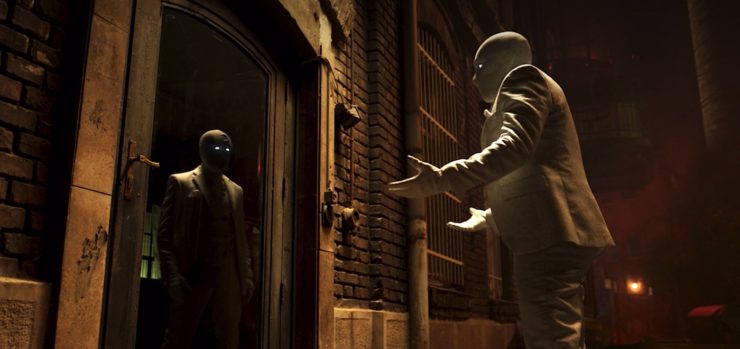
Once again my comments on this episode can best be summed up with adadfasggfdaggagfdh!!!!!!, but I’ll try to put my thoughts in an order, and, if possible, a language others can read.
How great was that suit summoning???
And how perfect are all the natural mirrors the show uses, either to allow Marc and Steven to talk, or to reinforce the idea of their fractured personality? Reflective walls, puddles, bowls, rearview mirrors, dark windows at night, the glass of Gus’ fish tank—it’s all so beautifully choreographed.
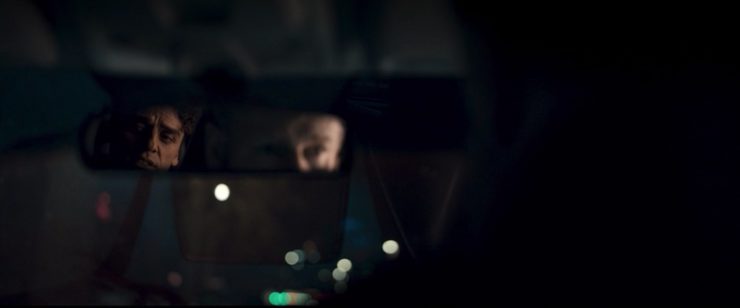
Seriously, I love the way the show is balancing Steven and Marc. Rather than just making Steven bumbling comic relief, and then getting him out of the way so serious mercenary Marc can take over, the writers are finding ways to involve Steven, and they’re giving space to his confusion and fear. (I think this is an especially good move to work with a character that’s not as well known as some of the other Marvel characters—Steven himself gets to be the onramp/audience avatar for people who are new to Moon Knight.) The fact that Arthur, the villain is the one who actually gets Steven, listens to him, and seems to genuinely want to help (kind of) is a really nice touch. As a former avatar of Khonshu, he understands the terror of living with all those voices and demands. If we want to get a little real world here, this felt similar to the tendency of people who have lived with mental illness to go into the mental health field—who can understand a person’a pain better than one who has also lived through it? But of course in this instance, Arthur’s empathy only goes so far. Ammit’s needs will always come first.
Even better is that Layla, seeing that Steven is real and not a put-on, accepts him as he is. How many times have we watched scenes of violence and sensory overload culminate in the hero somehow leveling up, bursting through all the noise and confusion to defeat the enemy? How easy would it have been for Marc to push past Steven’s defenses and come to the rescue? But no. Here Layla understands that Steven is overwhelmed and hits the brakes. Even with the jackal pounding the door down, she pushes her own fear aside and tells Steven they’ll find another way. Here Marc asks Steven to let him take over, but when Steven can’t drop his walls, Marc waits until later in the fight. And the writers work with that to give us a Steven-centric fight scene.
First off, the suit he summons—like, of course! Steven may well live in the Marvel universe, but no one seems to be talking about the Avengers or the Snap or that time Thor let a bunch of mythical animals get loose in London, so when Steven hears the word “suit” he thinks of a nice, well-tailored, dapper suit. But since he is still an avatar of Khonshu, it comes out white as fresh mummy wrapping, with a mask. He doesn’t know how to fight, so he just imitates what he thinks a fight is supposed to be, and punches an invisible jackal in the face. (Meanwhile, let me say it again, Layla glasses that jackal like they’re fighting over the jukebox in a dive bar. I love Layla.) He only cedes control to Marc when he realizes that innocent people are going to be hurt, which is a chef’s kiss character moment, and it also allows us to see the difference when Marc Spector, mercenary/conscious superhero, takes over fighting the mythical beast. We finally get our moonlit rooftop chase, we get Moon Knight using his crescent blades, and we get a skewered jackal who dissolves into sand.
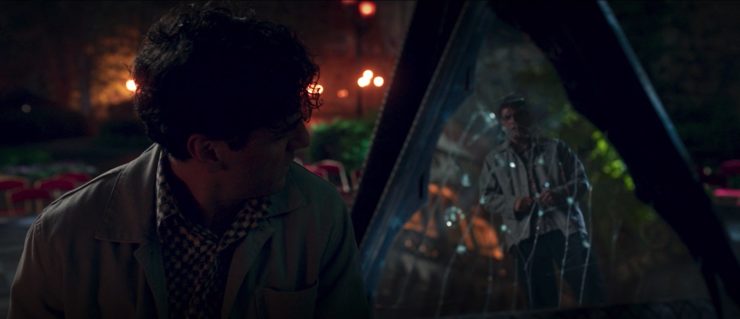
Which, again, leads into Leah’s Second Favorite Scene. Marc and Steven finally get to talk as people, with no looming fight. Steven learns how terrible it is to be locked away while Marc does stuff, and immediately recognizes that this is how Marc spends most of his time. Marc opens up about his fears for Layla, Steven freaks out at the idea that Marc’s killed people, Oscar Isaac plays both parts beautifully, and it all unspools while Steven stands forlorn in a shattered mirror.
But the best scene, I think, is the one Steven shares with Arthur. I’ll get into it a little more below, but the main thing I love is the razor sharp choices the show is making about Arthur’s fanaticism. For a few minutes, he really is the kindest person we’ve met so far. His followers seem happy. He’s doing real, quantifiable good. BUT. It’s all in the service of a fairly terrifying moral ideology. His love has limits, his empathy goes only so far, and ultimately people are just microscopic cogs in Ammit’s catastrophic plan. I love the way the show plays his particular style of religious mania against Steven’s dissociative despair. And then to learn that he was once Khonshu’s avatar? I’m assuming he’s telling the truth about that—his disgust for the god he used to love, but has since rejected for a different, better god, felt way too real. Ethan Hawke is layering an enormous amount of pain and deadpan wit into this performance so far, and his chemistry with Oscar Isaac is the highlight of a highlight-filled show.
Schrader Scale (of Judgement)
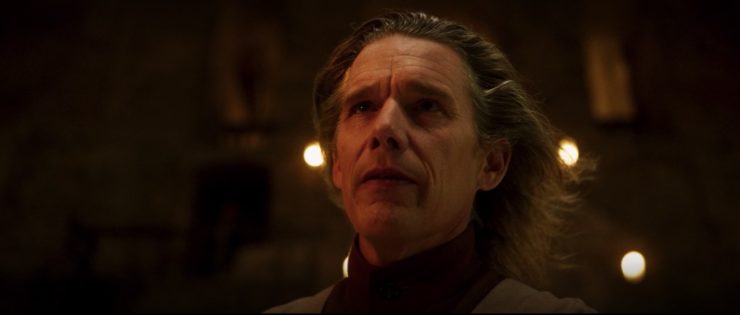
Not as much this week! Although I do feel bound to mention: Steven Grant, a gift shop worker, has to be bound to a bed with a leg restraint so he doesn’t wander off in the night. In Paul Schrader’s fourth film as writer/director, Cat People, Irena Gallier, a gift shop worker, has to be bound to a bed with multiple ropes so she doesn’t wander off into the night… as an enormous black leopard that eats people after having sex with them.
There’s also a fascinating conversation about free will embedded in the face off between Arthur and Steven, as Steven explains that while Khonshu’s justice comes only after people have committed evil, Ammit pre-judges, and will pre-emptively destroy all evildoers once she comes to power. This is how he plans to achieve “Heaven on Earth.”
There are a couple of things at work here. First, I’m super amused by Ammit-as-Ancient-Egyptian-Minority-Report, but let’s not drag PKD into this—while he and Paul Schrader certainly agree on some stuff, there are some branches even I am not prepared to wander out on
But what Steven and Arthur are really talking about it free will and the ability to change. Arthur wants Ammit to wipe Evil from the Earth, so the good can live in harmony. But this requires assuming that once a person’s personality is set there’s no hope for them, with, as Steven points out, the very real possibility that Ammit will murder children because she sees evil actions in their futures. Arthur even uses the analogy of getting rid of a diseased limb (which he describes in very ableist language so who’s evil now, Arthur?) which is maybe a nod to that bit in Matthew about casting your hand away if it offends you. But as Steven points out, children aren’t limbs, first of all, and thinking something is not the same as doing it. (Which is where you crash straight into the brick wall of Matthew 5:27–28, and the idea that, yes, thinking a thing is as bad as doing the thing, and that brick wall, of course, is the blank and unrelenting surface onto which most of Paul Schrader’s films are projected.)
But what they’re getting at, in a fun, comic book adaptation kind of way, is whether humans are capable of change. If a human commits evil (it’s too early in the morning to define evil) and then feels terrible about it, regrets it, makes amends in some way, changes their path—are they themselves evil? If a mystical entity can see into a person’s mind and see the potential for evil, should that entity hang back and allow them the possibility to change, to reject whatever the evil act was, to grow?
Is this too much to put on a comic book adaptation? Maybe! Go watch Cat People, it’s ridiculous, the Bowie song is fun, the Morodor score is GREAT, and Ed Begley Jr. gets his arm ripped all the way off by a leopard.
I can not read the hieroglyphs!
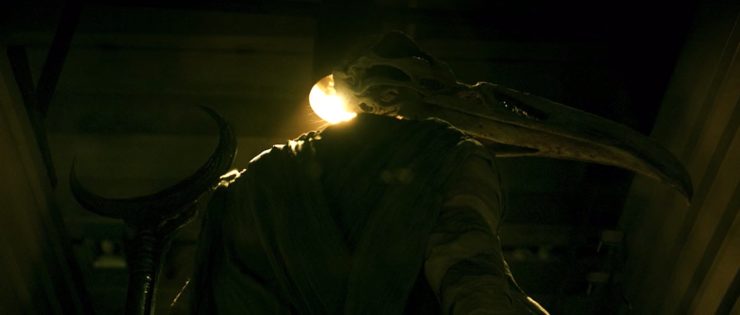
Oscar Isaac (to Oscar Isaac): “I don’t care how bloody handsome you are!”
***
Arthur: “I’m curious… do you think Khonshu choose you as his avatar because your mind would be easy to break? Or because it was broken already?”
Steven: “I’m not broken! I just need some help, maybe.”
Arthur: “That’s right. That’s why I’m here.”
***
Steven (pointing): “Goat!”
Arthur: “…yes.”
***
Arthur, on Khonshu: “He often throws temper tantrums. Like a two-year-old! None of the gods respect him. Perhaps that’s why he banished.”
***
Arthur, on Khonshu’s Columbo-like tendencies: “…but with Khonshu it’s always ‘one more thing.’”
***
Steven: “A thought can’t be evil, can it? I think about killing my boss all the time, but I wouldn’t actually do it!”
***
Steven: “I kind of draw a line there at child murder.”
Leah Schnelbach loves it when fights reveal character! Especially when that character is Steven Grant! Come debate free will at the vegan soup kitchen that is Twitter!










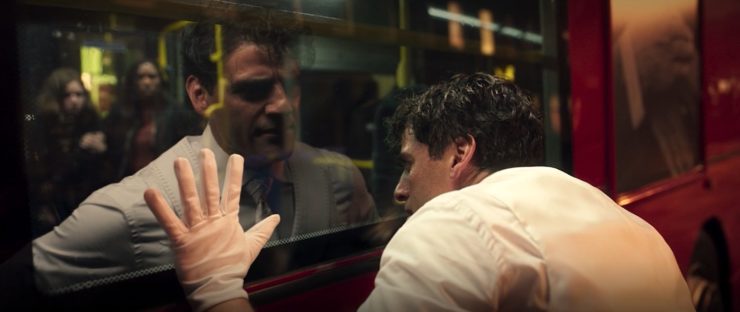
Okay, this is getting pretty darn good. It was very deft the way it handled the exposition through character interplay, in unexpected ways. I love how the seemingly weak and timid Steven got to be the one with the strength to stand up and say to the villain that you just don’t go around killing people because you think it’s justified. I love a protagonist with a strong moral compass (something the MCU hasn’t always given us).
I also really like that it didn’t stigmatize mental illness or the treatment thereof. It wasn’t the usual thing where the hero insists “I’m not crazy” and going to see a therapist is treated as something to be ashamed of. Steven’s boss seemed to sincerely want him to get help for his mental health issues, and Steven seemed genuinely grateful for the offer of assistance rather than humiliated by it. Steven was willing to check himself into a hospital and medicate Marc away before he hurt anyone else. And then there was that great line, “I’m not broken, I just need some help.” The only one stigmatizing mental illness, calling it things like “broken,” was the murdering villain.
Finally more screen time for Our Hero (and Hawke is doing a good job). I do wish he would make more puns…
This show is extremely well crafted, and Oscar Isaac is outstanding in his two roles. Ethan Hawke also deserves credit for selling a villain who thinks he is on the side of good.
Who would have guessed a superhero show would have contained such a nuanced discussion of good, evil and free will. And it was the meek Steven that cut right to the heart of the matter.
When it comes to defining evil, my favorite take still remains the one I read in the Doctor Aphra comics:
@4/Erkhyan: Wow, that’s a good line.
Well this is shaping up to knock Wandavision off its top spot perch for Disney + MCU series’ two excellent episodes now plot, action, humour, tight script and top notch acting, love the Mr. Knight suit It is one of the few things I did know about going into this but I didn’t think it would happen so early, but it’s perfectly judged,
Oscar Isaac is absolutely superbly cast here, I didn’t think we would get a more perfect casting choice in this phase of the MCU than Florence Pugh as Yelena but Isaac is already the best lead in an MCU project since RDJ. Ethan Hawke is also giving Josh Brolin a run for his money as best bad guy too. Role on next Wednesday..
Now I want to see Khonshu dubbed with the voice of Peter Falk…
@@.-@
Good line. It rather reminds me of the bit in Eastwood’s UNFORGIVEN about killing:” Its a hell of a thing, killing a man. You take away everything he’s got and everything he’s ever gonna have.”
I’m liking this series a lot compared to other recent Marvel outings, but I’m not really seeing the fast-paced? I mean, yes, a lot of things are happening very fast, but only a handful of them move the plot forward. You could easily combine the first two episodes into one if you remove all the bits where Steven asks Marc what the hell is happening, Marc refuses to answer for no good reason except that the writers have to draw out the reveals, and Steven acts out on lack of information. Maybe it’s just that I’ve been overexposed to the trope, but it feels like the split personality version of “half this movie/book could have been avoided with a phone call”.
@LS: This scene, more than any other so far, leans into the idea that these voices never really stop, and that Steven/Marc is in a constant battle with himself.
Yes, especially to the latter part, although Marc also explains to Steven that it’s never been this bad; like you mentioned, Steven has no memory of having experienced the virtual prison of the submerged identity before now.
The entirety of that conversation was excellent. So was the conversation with Arthur, and I’m with you on all the “natural mirrors” stuff. Once again, I really enjoyed the episode. My biggest disappointment was the lack of a single voice in the crowd wondering if this guy was a superhero / Avenger when the traditional costume was summoned, because this is a universe in which they exist.
I’m not particularly an Ethan Hawke fan, but Hawke’s actually holding his own with Oscar Isaac and Isaac’s doing a hell of a job. Good work from May Calamawy, too, as Layla comes to terms with the Steven/Marc situation.
@9/Atrus: “Marc refuses to answer for no good reason except that the writers have to draw out the reveals”
I think Marc has plenty of reason. He doesn’t want Steven to know any of this. He wants Steven to be in the dark, isolated from everything Marc has to do, whether for security’s sake or just for his own protection. Marc is a spy, basically, so he’s used to keeping things on a need-to-know basis. So when Steven starts to discover these things, Marc’s first reaction is to limit how much Steven knows, to try to prevent him from finding out the whole story. First he tries to take over again, then when that doesn’t stick, he tries to convince Steven to stop asking questions and just forget about it. It’s only once things get to the point that Steven is able to prevent Marc from taking over and refuses to submit to him that Marc is forced to reveal the things he never wanted Steven to know.
It’s also possible that Marc doesn’t think of Steven as someone who’s entitled to an explanation. He’s a split personality that Marc has always been able to take over from in the past, so maybe Marc doesn’t think of Steven as a real person, just an annoying glitch in his psyche. So, again, he has no reason to explain anything until he loses the ability to suppress Steven and is forced to convince him.
So it’s not just delaying the exposition. It reveals character — who these two personalities are, how they think, how they relate to one another.
It’s also just a good way to handle exposition. My writing mentor, Analog editor Stanely Schmidt, wrote a book about the craft of writing science fiction, and one of his bits of advice that I remember was that exposition is more interesting if you can put it in the context of character conflict, for instance if one character is trying to discover something that another character doesn’t want them to know. That gives it more intensity and emotional investment for the audience than a straight-up infodump.
“My biggest disappointment was the lack of a single voice in the crowd wondering if this guy was a superhero / Avenger when the traditional costume was summoned”
Maybe the crowd was too busy running away at that point?
I think it’s fascinating that the two most…literary, artistic…MCU shows (I’m distinguishing them because with all the various possibilities I feel I should judge, say, Loki, by different measures than Moon Knight) have taken dead aim at philosophy as the center.
Both WandaVision and Moon Knight deal with big philosophical concepts (the moral culpability of grief…Wanda, Agatha; the nature of free will…Harrow; as well as the concept of identity…Vision in the only visual examination of the Hobbesian continuatuion of the Ship of Theseus problem in the flesh, so to speak). These shows are artistically deep (along with the first season of Jessica Jones, BTW). But I’m glad they come out once a week.
Falcon and Winter Soldier, Loki, Hawkeye (and Daredevil, Luke Cage, and Iron Fist) I could binge. I love them all, but I always had to stop watching Jessica after one episode to digest, and I was really glad that WandaVision and Moon Knight have week breaks. I need time to process.
Again to add: this doesn’t make them objectively better, because “entertaining” is as socially valuable as “high concept”, but it does mean that I enjoy chewing on them and discussing with friends and family in the in-between.
Well – assuming he didn’t actually judge him – I think Harrow of course loses whatever credibility he might have had when he is perfectly willing to kill a homeless guy to get the scarab (especially given how easily he probably could have gotten it from him).
I do really enjoy the debate though as ‘value-of-life’ issues/debates are definitely my jam ;) I get the impression that (at least so far we can assume) that Amnit’s judgement is infallible – perhaps she is omniscient/outside time so it isn’t just, as Arthur says, killing people for thoguhts, like idly fantasizing about killnig your boss, but for somethign you absolutely will do. And in a way that IS a very interesting debate. Assuming you believe death is an appropriate punishment in the first place (and even that is debateable – plenty of people are opposed to that as well and I myself am kind of philsophically opposed even though I am emotionally/pragamatically in favor at times) – I suppose if you are a being OUTSIDE of time does it matter when the punishment happens? 10 years before? A week before? 1 milisecond before?
I mean, in some sense, yes, because you are now also cutting off any possibility of GOOD that they might have done in the meantime even if they also did bad, or even the good that might come out of the bad (not that I think THAT is a justification for doing bad! That’s a different sort of heresy lol). Or the good they might do afterwards.
Not to mention that there’s a whole line of debate in terms of how we decide who ‘deserves’ to live in the first place, and how you weigh those scales and make those decisions. As tempting/easy as it is to try and do that it always turns out badly, imo.
And of course if her judgement is NOT infallible (to say nothing of humans making this judgement or deciding to take it upon themselves) then that opens many more worms – the only options are not just ‘let a diseased limb fester’/’cut it off’, of course. In a way it’s kind of the opposite of the dillemma we see in Spider-Man: No Way Home on how far you should go to ‘heal’ people (even if I did think that movie’s solution was maybe a little too easy/simplistic in how it portrayed the ‘cure’). Or even something like Star Wars – at one point is risking everything to save one person’s soul worth it? All really important questions in my mind, and I generally always fall on the pro chance/potential for redemption side even if real life has made me SO much more cynical, and I can in some ways understand the appeal of just wanting to ‘weed the garden’ so to speak (which actually is also a Biblical metaphor in some ways…although the metaphor there is actually to allow the chaff to grow with the wheat until the proper time) in order to save the innocent and vulnerable, especially if you think you can trust in some higher judgement. Not saying I think that’s RIGHT, but I just see where the appeal and temptation comes in.
And of course, yes, children (or people in general) are not diseased limbs, and I have a lot of thoughts about that as well and are very use/value based culture.
I’m definitely really excited to keep discussing this here :)
Regarding other stuff and what other people have said: yes to all the stuff about how awesome the acting is, and I love that Steven still gets to be a ‘main’ character so to speak and add his own value!
I still love the music, including the ending song over the credits! I grew up in an area with a high proportion of Middle Eastern immigrants and we used to eat at Middle Eastern restaurants a lot. I remember one place would always play (I think) Lebanese music and even though the song here was obviously very ‘modern’ there were a lot of elements in the cadence/style that reminded me of that and brought back a lot of memories. And the score remains awesome as well.
Also, regarding the alters, I wonder how this will compare to some of the other works I’ve read that involve “alternate” personalities (some with varying levels of ‘authenticity’ as it relates to the real world), and if they will eventually be integrated or not.
The ones I can think of are:
Rand al’Thor/Lews Therin in the Wheel of Time (maybe not exactly this type of thing since it’s more a case of a reincarnated soul across time, and there is debate as to how ‘real’ the memories were, how much was magical insanity, etc).
Shallan in Sanderson’s Stormlight Archive, whose alters are partially due to trauma but also have some ‘magical’ implications an also may or may not end up integrated with the ‘real’ Shallan (as far as we know). She can take on the various personas but I don’t believe she loses time/memory, exactly (usually – I think there is at least one incident in a recent book where it turns out one of them did do something without her knowledge), although sometimes they do vie for control.
Also from Sanderson, but I think less well known (although I actually really like these stories!) – Stephen Leeds, who features in a few short stories and basically generates alters at need to learn various hyper specialized skills to aid in his work as some type of mercenary/detective. However in his case he knows he is the one ‘in charge’ and can basically converse/talk with them and sets up his own life/house to always maintain the illusion that they are ‘real’.
@13/Lisamarie: Even if Ammit is correct about what people will do in the future, that doesn’t mean killing them should be your first and only resort for preventing it. I mean, if you can prevent that future by killing them, then the future is mutable, and that means you can prevent that future in other ways too, like changing their minds or putting them onto a different path. Jumping to execution as your default move isn’t justice, it’s just an excuse to be a serial killer and pretend it’s beneficial.
I mean, the fundamental contradiction in Harrow’s whole “I’m killing people before they do evil” schtick is that killing people IS evil. It’s the textbook definition of evil. (See the line Erkhyan quoted above. If evil is taking choice away from others, nothing does that more than killing them.) Even if it’s sometimes a necessary evil, that doesn’t make it good. So why is Harrow himself exempt from the zero-tolerance judgment he inflicts on everyone else? Is that at all fair?
“ultimately people are just microscopic cogs in Ammit’s catastrophic plan”
Designed and directed by her dread right hand, no doubt.
Haven’t seen this episode yet—I am hoping that Harrow (trying hard not to use first person here) will start making puns…that’s my trademark and if they’re going to use my name they should use that too
@15 – oh yeah, it all falls apart once you think about it too much. If things can change, why not change in some other way? (Which I realize is what you just said lol).
Ultimately it’s just moving the evil/violence around, but not reducing/removing it (well, I guess somebody COULD try to argue that killing one person is ‘less’ evil than that person killing 10 people but I find those types of equations never quite work out).
@17: Indeed. You don’t know me, but I am familiar with your punnery from the Prancing Pony Podcast and from participating in the PPP Moot, and I have to admit that every time the show explicitly refers to “Arthur Harrow” (primarily in the subtitles), I think of you first, rather than the character in question.
@17 and 19… felt the need to say I am also familiar(ish) with AH from the PPP (and the facebook group!).
Hi, y’all!
I am really enjoying the show so far.